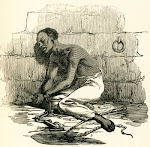 Have big retail stores found a way to curb the enthusiasm of thousands of Occupy Movement protesters who may have plans in the making to disrupt what is usually considered their blackest day of the year--Black Friday?
Have big retail stores found a way to curb the enthusiasm of thousands of Occupy Movement protesters who may have plans in the making to disrupt what is usually considered their blackest day of the year--Black Friday?Unfortunately, it seems that way.
With the possibility of business-disrupting protests becoming a growing reality, already these big retailers may be mobilizing an army of lawyers to help protect their bottom line, and send a chilling message to those who may be contemplating sit-ins and other protest tactics to bring attention to how corporations--multinational and otherwise--have conspired with congress to keep the people of this nation captive to crass commercialism and to the might of their congress-corrupting dollars.
In an article titled, "Could Occupy Wall Street protesters be sued for Black Friday tactic?" the dreary prospect is raised, and it offers those who would love to see an ignominious end to the movement yet another weapon--besides police in riot gear, armed with rubber bullets, gas canisters and pepper spray--with which to deploy to defeat this inconvenient movement.
They can also bring lawsuits seeking damages, says John Banzhaf, a legal expert who teaches a class called "Torts R Us.”
Yes, Occupy protesters contemplating illegally squatting in “publicly traded” stores such as Neiman Marcus and Wal-Mart on Black Friday, might want to check to see if the stores are litigious before sitting down in front of a pallet of children’s toys. If the store owner is so inclined, lawsuits seeking damages could be in order.
Yes, a lawsuit seeking thousands of dollars could be filed, says Mr. Banzhaf, who has been called “a legal flamethrower” and teaches at George Washington University Law School.
“It could be a deterrent,” he says. “No one wants to have a huge judgment hanging over one’s head, you can be asked embarrassing questions in court – no one wants to go through that.”
He says the lawsuits can be aimed at a group, if they are organized, or even an individual who can be sued for the total amount of damages. If the damages are intentional, he says, a court could impose punitive damages as well. “Punitive damages are usually more than ordinary damages and that would act like a deterrent as well,” he says.
Banzhaf says he doesn’t know of any lawsuits brought against protesters so far, but he thinks they could eventually happen.
“It will only take one lawyer who gets stuck in an illegal demonstration and suffers a business loss,” says Banzhaf. “Or, perhaps some people can’t get into an office because protesters are blocking the way [and] decide they want to do something about it.”
Banzhaf, who says he is a big proponent of First Amendment rights, says the lawsuits would only deal with illegal activities. “At a university, you have a right to sit-in, to write, to walk around – but not to block people from coming into classrooms.”
One thing that characterizes the Occupy Movement, and has harried its detractors from the very beginning, is that it's near impossible to identify its leadership. As long as the movement remains amorphous (once seen as a negative, but now a blessing), and without discernible leaders, it minimizes its chances of facing litigation from those entities it would highlight for promoting egregious acts against the public good.
The movement would do well to elicit the help of other protest groups--those, for example, seeking to protect the environment from polluters who would would rape it for profit. The ACLU may be persuaded to step in as needed, as well as other sympathizers in the legal community, individuals and well as legal agencies with the necessary expertise to advise and represent the protesters.
For all its potential to derail the movement, litigation may not be the magic bullet to the head of the movement that some detractors may be pinning their hopes on.
Michael Ratner, president of the Center for Constitutional Rights, thinks Banzhaf’s idea is “a real stretch.”
Mr. Ratner, who has acted as a legal observer for the Occupy movement, says civil disobedience has been a hallmark of protest in the country practically since the Revolutionary War. During the civil rights era, Americans sat in at Woolworth’s lunch counters to protest discrimination. Animal rights activists have been known to participate in civil disobedience.
“I would consider this a misuse of a lawyer’s time and a misunderstanding of protest in this country,” says Ratner. Read the complete article here.
Recently, we saw what the threat of law suits can do in certain cases, practically silencing the women accusing Cain of sexual harassment, notwithstanding the credibility of their claims:
In general, [Atlanta attorney Lin Wood hired by Cain]...said anyone considering making public accusations of wrongdoing against another person should carefully consider the wisdom and potential consequences in taking such action.
"Anyone should think twice before you take that type of action," Wood said. "And I think it's particularly true when you are making serious accusations against someone running for president of the United States, but I think it's equally true if you are making those accusations against your next door neighbor."
Asked to respond to Wood's "think twice" comment, Kraushaar's lawyer, Bennett, said: "I have not heard his statement, but statements of that nature could intimidate or discourage women from reporting sexual harassment."
And the ploy seemed to have worked: "The two public accusers — Bialek and Karen Kraushaar — had planned to hold a joint press conference, but on Thursday Kraushaar decided against it."
It's my hope that no matter what challenges are thrown their way, the Occupy Movement will remain amorphous enough, flexible enough, and nimble enough (which in hindsight seems more by design than happenstance), to morph into whatever form necessary so that the movement will continue to be a thorn in the side of those who have been a thorn in our side for years.







